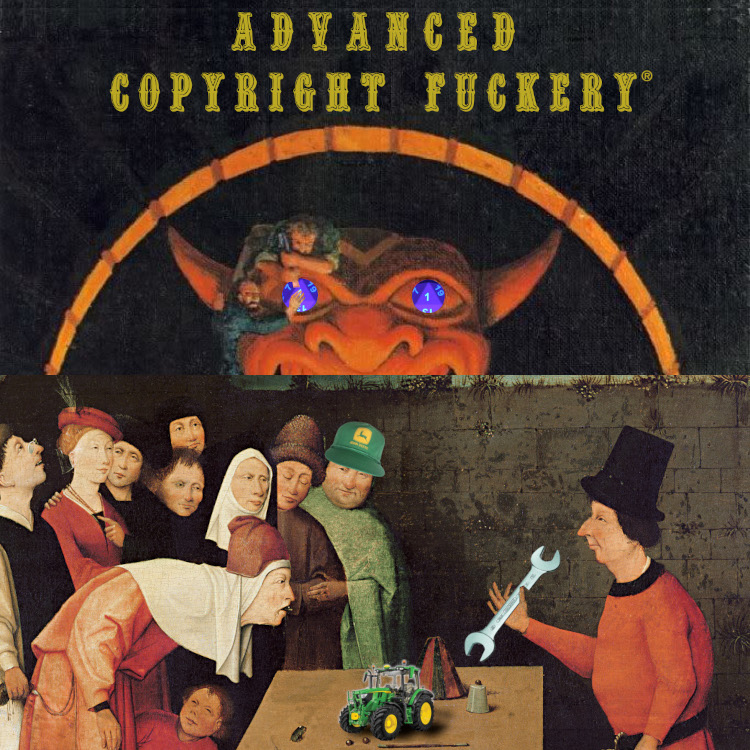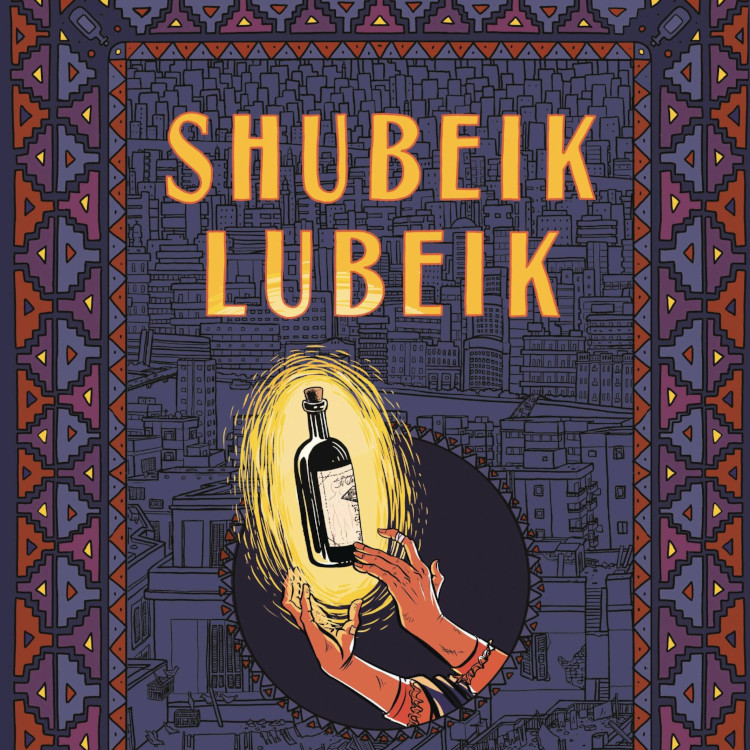
Last week, a seeming miracle came to pass: @JohnDeere, the #BigAg #monopolist that - along with @Apple - has led the Axis of Evil that killed, delayed and sabotaged dozens of #RightToRepair laws, sued for peace. 1/ 

They announced a Memorandum of Understanding with the American Farm Bureau Federation to make it easier for farmers to fix their own tractors:
fb.org/files/AFBF_Joh…
This is a move that's both badly needed and long overdue. 2/
fb.org/files/AFBF_Joh…
This is a move that's both badly needed and long overdue. 2/
Deere abuses copyright law to force farmers to pay for official repairs - even when the farmer does the repair. That's possible thanks to a practice called #VINLocking, in which engine parts come with #DRM that prevents the tractor from recognizing. 3/
After a farmer fixes their tractor, they still have to they pay hundreds of dollars for a John Deere technician to come to their farm and type an unlock code into the tractor's console:
doctorow.medium.com/about-those-ki… 4/
doctorow.medium.com/about-those-ki… 4/
Like all DRM, VIN locks are covered by Section 1201 of the #DigitalMillenniumCopyrightAct (#DMCA), a 1998 law that criminalizes distributing tools to bypass "access controls," even if you do so for a lawful purpose (say, to fix your own tractor using a part you paid for). 5/
Violations of #DMCA1201 carry a penalty of 5 years in prison and a $500k fine - for a first offense.
This means that Deere owners are locked into using Deere for repairs, which also means that if Deere decides something isn't broken, a farmer *can't* get it fixed. 6/
This means that Deere owners are locked into using Deere for repairs, which also means that if Deere decides something isn't broken, a farmer *can't* get it fixed. 6/
This is very bad news indeed, because John Deere tractors are just computers in a fancy, mobile case, and John Deere is *incredibly bad* at digital security:
pluralistic.net/2021/04/23/rep… 7/
pluralistic.net/2021/04/23/rep… 7/
That's scary stuff, because John Deere is a monopolist, and a successful attack on the always-connected, networked tractors and other equipment it supplies to the world's farmers could endanger the global food supply. 8/
Deere doesn't *want* to make insecure tractors, but it also doesn't want to be embarrassed by security researchers who point out that its security is defective. 9/
Because security researchers have to bypass Deere tractors' locks to probe their security, Deere can leverage DMCA1201 into a veto over who gets to warn the public about the mistakes it made. 10/
It's not just security researchers that Deere gets to gag: the company uses its repair monopoly to threaten farmers who complain about its business practices, holding their million-dollar farm equipment hostage to their silence:
pluralistic.net/2022/05/31/dea… 11/
pluralistic.net/2022/05/31/dea… 11/
This all adds up to what @saurik calls #FelonyContemptOfBusinessModel, an abuse of copyright law that allows a monopolistic corporation to reach beyond its own walls and impose its will on it customers, critics and competitors:
locusmag.com/2020/09/cory-d… 12/
locusmag.com/2020/09/cory-d… 12/
If Deere was finally suing for peace in the #RepairWars, well, that was wonderful news indeed - as I said, a seeming miracle.
But - like all miracles - it was too good to be true. 13/
But - like all miracles - it was too good to be true. 13/
The MOU that Deere and the Farm Bureau signed is full of poison pills, gotchas, fine-print and mendacity, as @LaurenGoode documents in her @WIRED article, "Right-to-Repair Advocates Question John Deere’s New Promises":
wired.com/story/right-to… 14/
wired.com/story/right-to… 14/
For starters, the MOU makes the Farm Bureau promise to end its advocacy for state Right to Repair bills, which would create a repair system governed by democratically accountable laws, not corporate fiat. 15/
Clearly, Deere has seen the writing on the wall, after the passage in 2002 of Right to Repair laws in New York and Colorado:
eff.org/deeplinks/2022… 16/
eff.org/deeplinks/2022… 16/
These two bills broke the corporate anti-repair coalition's winning streak, which saw dozens of state #R2R bills defeated:
pluralistic.net/2021/05/26/nix… 17/
pluralistic.net/2021/05/26/nix… 17/
Deere's deal-with-the-devil is a cynical ploy to brake R2R's momentum and ensure that any repairs are carried out on Deere's terms. Now, about those terms... 18/
Deere's deal offers independent repair shops access to diagnostic tools and parts "on fair and reasonable terms," a murky phrase that can mean whatever Deere decides it means. 19/
Crucially, the deal is silent on whether Deere will supply the tools needed to activate VIN locks, meaning that farmers will still be at Deere's mercy when they effect their own repairs. 20/
What's more, the deal itself *isn't legally binding*, and Deere can cancel it at any time. Once you dig past the headline, the Deere's Damascene conversion to repair advocacy starts to look awfully superficial - and deceptive. 21/
One person who wasn't fooled is @sickcodes, the hacker who has done the most important work on reverse-engineering Deere's computer systems, culminating in last summer's live, on-stage hack of a John Deere tractor at @defcon:
pluralistic.net/2022/08/15/dee… 22/
pluralistic.net/2022/08/15/dee… 22/
Shortly after the announcement, Sick.codes tweeted how the fine-print in the MOU would have prevented him from doing the work he's already done (including "a direct stab at me lol"):
https://twitter.com/sickcodes/status/161248493549505740923/
As with other instances of #monopolistic, corporate copyfraud - like, say, the deceptive #OpenGamingLicense - the John Deere capitulation is really a bid to take away your rights, dressed up as a gift of more rights:
https://twitter.com/doctorow/status/161320065747697664124/
• • •
Missing some Tweet in this thread? You can try to
force a refresh






















